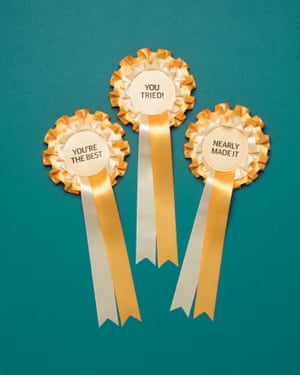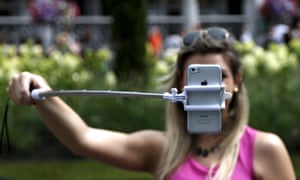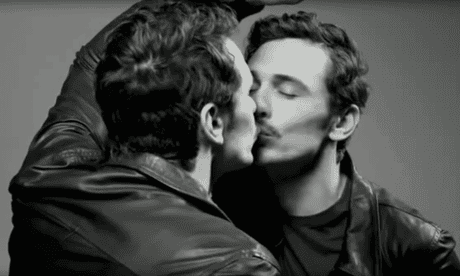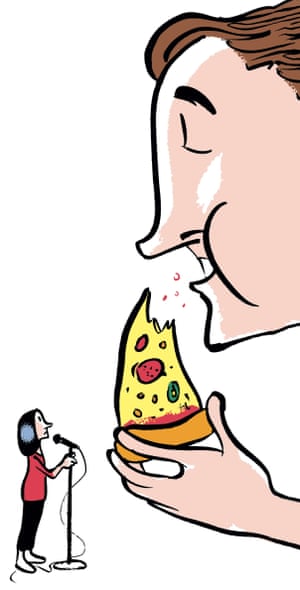It was 2010 and the newspaper I worked for in Sydney commissioned me to interview yoga entrepreneur Bikram Choudhury.
He was in town to open the first of a chain of hot yoga studios. Choudhury’s brand of yoga – which he had trademarked and franchised – involved 26 poses in a humid, heated room with mirrors and carpets. When I visited the studio and caught the stench and the robotic instructions from a mic’d-up teacher, I thought: Yeah, this won’t take off.
I had been doing yoga for a decade by the time I met Choudhury. Once or twice a week, I’d go to nice, easy hatha classes, wearing whatever old tracksuit was to hand – just like everyone else in the room. Yet my progress was slow; I had never managed to get beyond beginners’ level. I was always at the back of the class, struggling to get my arm behind my calf to touch my other hand. I just assumed that this pace was my natural limit.
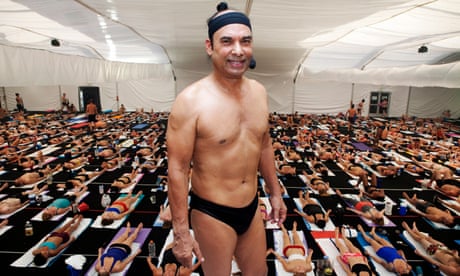
'He said he could do what he wanted': the scandal that rocked Bikram yoga
In his suite with harbour views, Choudhury told me about all the famous people who did his yoga – people such as Madonna and Jennifer Aniston. Then he looked me up and down.
“You,” he said. “You need to do some Bikram. You are overweight.”
“What? Huh?” I said, shocked at this breach in interview etiquette.
“Do my yoga,” he said, indicating a pair of lithe Bikram yoga instructors seated at his feet, “and you could look like them.”
For years after meeting him, I would walk past the fogged-up, vile-smelling Bikram yoga studios and think: screw you, Bikram.
But part of me also wondered if he had a point – could you completely change your body shape by doing his yoga? Should this even be an aspiration when you do yoga?

FacebookTwitterPinterest Yoga has morphed into a physical and spiritual ideal to which you aspire. Photograph: Alamy Stock Photo
Choudhury is now in the sin bin. In 2016, he lost a lawsuit in which a former employee had claimed sexual harassment and wrongful termination – and he was ordered to pay $7m in damages.
But yoga – hot, cold – and all sorts of novelty yoga (including nude yoga, beer yoga and goat yoga) is booming. In the past decade, it has morphed from being an exercise you might do once a week at your local gym to a lifestyle – and a physical and spiritual ideal to which you aspire.
According to a 2016 Yoga Journal report, 36.7 million people practise yoga in the US, up from 20.4 million in 2012. The yoga market is now worth $16bn (£12bn) in the US and $80bn (£74bn) globally. In the UK, “yoga” was one of Google’s most searched-for words in 2016, while the yoga and pilates business brings in £812m a year, and rising.
People are packed into classes, which cost north of £10 a pop, yoga teacher training costs thousands (fees start at around £1,500 and can go to £5,000) and yoga retreats are pricey.
It is not just the studios. Take a look at the market for yoga mats. According to market research company Technavio, the US yoga and exercise mat business is expected to climb from $11bn (£8bn) now to $14bn (£10bn) in 2020. Sales of athleisure clothing, generated $35bn (£25bn) in 2015 – an all-time high – making up 17% of the entire US clothing market, according to market research firm NPD Group. Yoga pants by Lorna Jane cost $110, while GQ magazine has described Lululemon’s yoga pants as a cult obsession among “a certain set of gym-minded women and busy moms across the country”. You can even buy Lululemon prayer beads for $108 (£80).
In my local area of Sydney, upmarket yogis have colonised the high street. Most people I see walking around the city’s Bondi suburb have stopped wearing proper clothes. Unless you are around the bus stops in time for the morning commute, people dress almost exclusively in exercise gear – yoga pants, vest top and hoodie, flip flops in the summer, trainers in winter. They loiter in the aisles of the organic fruit and vegetable shop, their yoga mats hitting me in the face when they turn around. They zip around the narrow streets by the beach on mopeds or bicycles and, after class, gather around the large communal tables of cafes, sipping $10 juice in mason jars or almond milk chai.

FacebookTwitterPinterest ‘After class they gather around sipping $10 juice.’ Photograph: Alamy
Secretly I wanted to be them. But it was more than just a look. Every yoga class I tried out in Bondi had a semi-spiritual element that I found enticing. At the start of class, the teacher might read some Sanskrit verse, or play sitar music while reading from a spiritual book – such as Eckhart Tolle. In increasingly non-religious countries such as the UK and Australia, this is where a lot of young people receive their moral or spiritual teachings.
In many respects, yoga is the perfect pastime for our age – the meditative elements give us the opportunity to find peace and stillness in a time of increasingly hectic and crowded information, the instructional bits give us moral lessons in the absence of traditional religion, while the stretchy, bendy, sweaty physical stuff is a great way of countering eight or more hours a day spent hunched over a computer. But is any of this yoga making us more enlightened or more compassionate? Or is it just another wellness industry trend that only the rich and idle can afford to properly indulge in?
One day last year, after my usual weekly class in a studio full of part-time models, I came across a flyer. It promised that in six weeks I could become a “modern yogi”. All I had to do was to attend classes six times a week, meditate daily, keep a journal and take part in weekly meetings that are part tutorial on mindfulness and part group therapy. The programme promised that “an exciting transformation will occur”. Could I become one of those people I saw walking around Bondi – yoga mat strapped to my back, my Instagram feed full of downward dogs on the cliffs, with a Pacific Ocean sunset in the background?
I started the $600 programme, stuck with it and found things started to shift. After doing yoga and meditation every day for six weeks, my body felt looser, more pliable. Getting up during cold winter mornings and bending down to pick a sock up off the floor became a lot easier. Physically it was tough, and it took a month to really get my fitness level moving, but gradually I was able to keep up with the more athletic Vinyasa classes. At the end of 90 minutes, I would be covered in sweat and felt a curious mix of exhausted and blank. The repetitive sequences became a routine that I did robotically, without thinking. I was bored in class, but I also turned off my mind and the classes themselves became like a moving meditation.
As for the spiritual aspect, occasionally the weird speeches the yoga instructors gave hit home. On Friday in my first week, in a move that shocked just about everyone, Britain voted to leave the European Union. The teacher, an Irishman, referenced Brexit in his sermon about 45 minutes into the class. “You might not like change. You may resist change,” he said, walking around the heated room. “You may not agree with it. You may think the change is a bad thing. A very bad thing. But change has happened. It has happened and you can’t do anything about it. To resist it is pointless.” His voice was heavy, sorrowful, and he sighed. “It is what it is.”
There was a feeling in the class that we needed to hear things like this – but afterwards, I thought: Is this going to be the extent of our resistance and our protest against political situations that we don’t like? We stretch and get a sermon, go and have a juice – and that’s it?

FacebookTwitterPinterest ‘Occasionally the weird spiritual speeches the yoga instructors gave hit home.’ Photograph: Getty Images/Topic Images
I started thinking a lot about yoga and so many activities that are part of the wellness industry, and how so many people pour energy into their bodies when perhaps they should be trying to pour energy into the people and politics around them. Self care is great – but what if there’s no energy left to care about anyone else?
In the New York Times, American writer Judith Warner noted a disturbing social trend. Just as the women of the mid-70s took flight into consciousness-raising groups, the workforce, divorce and casual sex, their daughters are also taking flight, but that flight is inwards. “They’re fleeing to yoga,” she writes in the Times, “imitating flight in the downward-gazing contortion called the crow position. They’re striving, through exquisite new adventures in internal fine-tuning, to feel more deeply, live more meaningfully, better inhabit each and every moment of each and every day.”
Warner glumly, but correctly, concluded: “There is no sense that personal liberation is to be found by taking a more active role in the public world.” In fact, “such interiority seems to be a way to manage an unbearable sort of existential anxiety: a way to narrow the scope of life’s challenges and demands … to the more manageable range of the in-and-out of your own breath.”
The more yoga I did, the more compliments I received. My hair was shiny – people commented – and my skin glowed, my clothes were looser, and, like so many others, I began wearing athleisure gear to work. After all, work was just a pit stop on the way to another yoga class. Maybe Choudhury was right after all – maybe I could look different if I did a lot of yoga.
I wrote in my journal, I went to the Monday-night tutorials, I meditated, I drank cold-press juices, I did all the right things to become a modern yogi. I was on the way to achieving the ideal of the glowy person in the organic shop. I was almost there before I started wondering – is this really what I wanted to be?
The answer was, of course, no. I was a yogi for about two months before the narcissism of the whole enterprise got to me. There were other things, it turned out, that I had to do.

